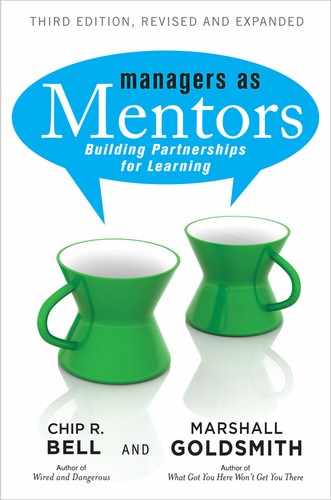The Qualities of Great Mentoring
Great mentors are not immune to traps; great mentors recognize the traps they are likely to fall into and work hard to compensate for them. How do they do that? They do it by understanding the qualities of a mentor-protégé relationship focused on discovery and learner independence—and then learning to be living, breathing models of those qualities.
First and foremost, great mentoring is a partnership. And partnership starts with balance.
Balance
Unlike a relationship based on power and control, a learning partnership is a balanced alliance, grounded in mutual interests, interdependence, and respect. Power-seeking mentors tend to mentor with credentials and sovereignty; partnership-driven mentors seek to mentor with authenticity and openness. In a balanced learning partnership, energy is given early in the relationship to role clarity and communication of expectations; there is a spirit of generosity and acceptance rather than a focus on rules and rights. Partners recognize their differences while respecting their common needs and objectives.
Truth
Countless books extol the benefits of clear and accurate communication. Partnership communication has one additional quality: it is clean, pure, characterized by the highest level of integrity and honesty. Truth-seekers work not only to ensure that their words are pure (the truth and nothing but the truth) but also to help others communicate with equal purity. When a mentor works hard to give feedback to a protégé in a way that is caringly frank and compassionately straightforward, it is in pursuit of clean communication. When a mentor implores the protégé for candid feedback, it is a plea for clean communication. The path of learning begins with the mentor’s genuineness and candor.
Trust
Trust begins with experience; experience begins with a leap of faith. Perfect monologues, even with airtight proof and solid support documentation, do not foster a climate of experimentation and risk taking. They foster passive acceptance, not personal investment. If protégés see their mentors taking risks, they will follow suit. A “trust-full” partnership is one in which error is accepted as a necessary step on the path from novice to master.
Abundance
Partnership-driven mentors exude generosity. There is a giver orientation that finds enchantment in sharing wisdom. As the “Father of Adult Learning,” Malcolm Knowles, says, “Great trainers [and mentors] love learning and are happiest when they are around its occurrence.”1 Such relationships are celebratory and affirming. As the mentor gives, the protégé reciprocates, and abundance begins to characterize the relationship. And there is never a possessive, credit-seeking dimension (“That’s MY protégé”).
Passion
Great mentoring partnerships are filled with passion; they are guided by mentors with deep feelings and a willingness to communicate those feelings. Passionate mentors recognize that effective learning has a vitality about it that is not logical, not rational, and not orderly. Such mentors get carried away with the spirit of the partnership and their feelings about the process of learning. Some may exude emotion quietly, but their cause-driven energy is clearly present. In a nutshell, mentors not only love the learning process, they love what the protégé can become—and they passionately demonstrate that devotion.
Courage
Mentoring takes courage; learning takes courage. Great mentors are allies of courage; they cultivate a partnership of courageousness. They take risks with learning, showing boldness in their efforts, and elicit courage in protégés by the examples they set. The preamble to learning is risk, the willingness to take a shaky step without the security of perfection. The preamble to risk is courage.
Ethics
Effective mentors must be clean in their learner-dealings, not false, manipulative, or greedy. Competent mentors must be honest and congruent in their communications and actions. They must not steal their learners’ opportunities for struggle or moments of glory. Great mentors refrain from coveting their learners’ talents or falsifying their own. They must honor the learner just as they honor the process of mutual learning.
Partnerships are the expectancy of the best in our abilities, attitudes, and aspirations. In a learning partnership, the mentor is not only helping the protégé but also continually communicating a belief that he or she is a fan of the learner. Partnerships are far more than good synergy. Great partnerships go beyond “greater than” to a realm of unforeseen worth. And worth in a mentoring partnership is laced with the equity of balance, the clarity of truth, the security of trust, the affirmation of abundance, the energy of passion, the boldness of courage, and the grounding of ethics.
